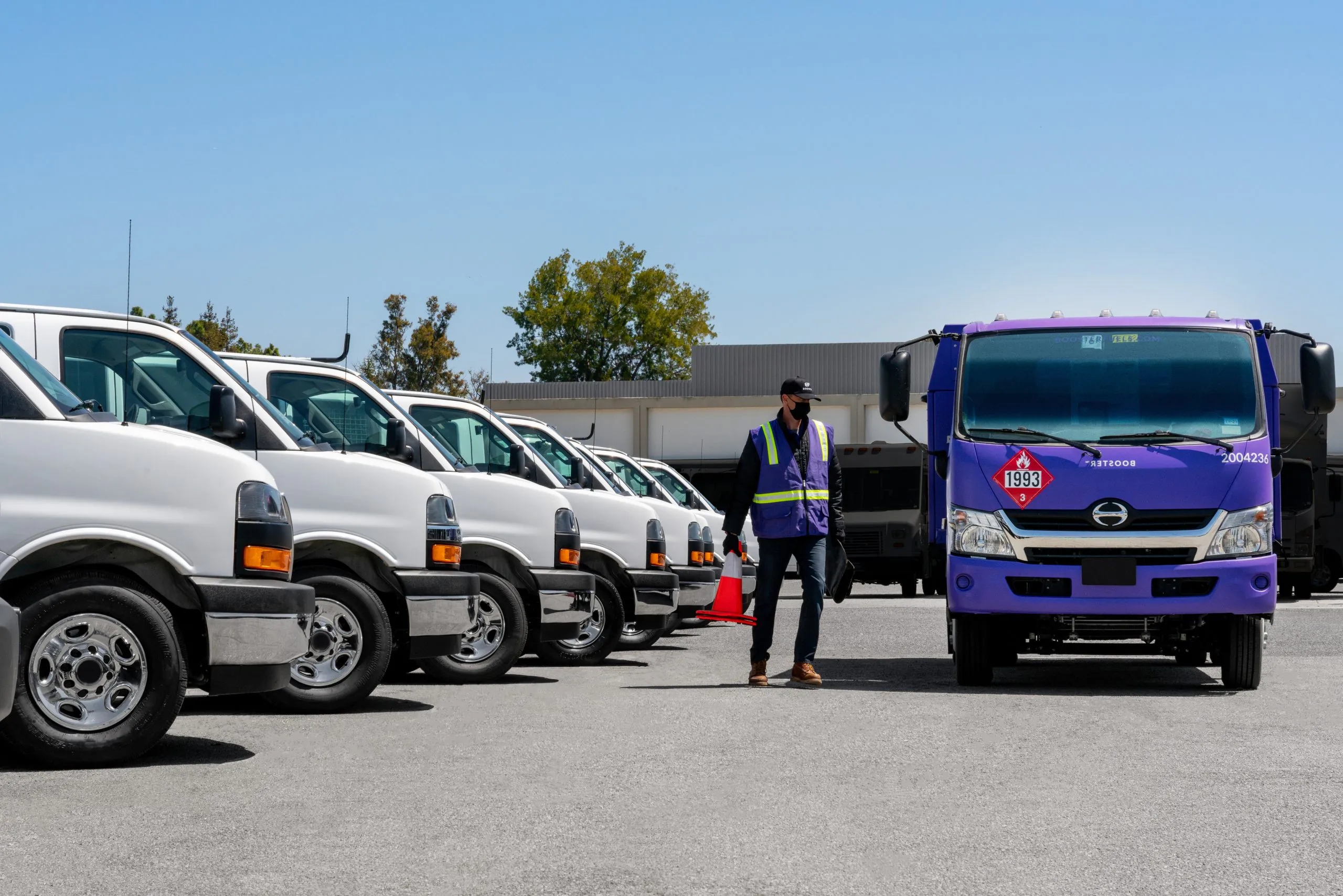In an industry where the handling of hazardous materials is part of the daily routine, safety isn’t just a priority — it’s a commitment. And it’s one we take very seriously at Booster. It is at the heart of every interaction, service, procedure, and conversation.
Here’s a closer look at how our consistent and intentional pursuit of safety best practices helps our service professionals deliver a Perfect Boost every time we visit your vehicles.
A Mindset of Proactive Prevention
Our best practices are rooted in a simple idea: “The safest accidents are the ones that never happen.” Transporting and dispensing fuel brings inherent risk – from spills and leaks to theft and environmental damage – especially in traditional gas‐station settings with underground tanks.
Rather than simply react to accidents, we emphasize identification and mitigation of potential dangers before they have the chance to escalate into full-blown hazardous conditions. On-site, this means daily exercises, yard inspections, shift-start audits, and constant hazard monitoring of equipment and our environment. It only takes 10 gallons of gasoline to contaminate as much as 11 million gallons of groundwater, risking our team and our community. Understanding these risks just underscores why prevention matters – not just for operational safety, but for environmental stewardship.
Our safety pillars help us protect the land we work on, both in our tanker lots and in your vehicle lots.
Three Pillars of Safety
Our three pillars of safety are Personal, Compliance, and Environmental.
Personal Safety
Booster doesn’t exist without our people or without yours. The safety of our team members, our customers, and our surrounding communities are vital. We emphasize not just regulatory adherence but real-world procedures that make sense: pre-shift hazard reviews, supervisor audits, proactive yard-inspections with new clients, and tools like automatic shutoff nozzles and 30-gallon fuel-limit switches in their tankers to make sure everyone near the tanker is protected at all times.
Safety Compliance
Booster doesn’t just meet the bar when it comes to compliance and safety. We aim to raise it. Not only do we adhere to all relevant transportation, storage, and dispensing regulations – including those from the Federal Motor Carrier Safety Administration (FMCSA), the National Fire Protection Association (NFPA), and the Environmental Protection Agency (EPA) – we also work closely with regulators to help the community leaders where we work champion exemplary standards for mobile fueling.
Most recently, our policy team supported Washington State’s HB 2873 to streamline mobile-fueling permitting across fire districts.
Additionally, our new-driver training exceeds DOT and FMCSA requirements, meaning our drivers are as qualified as possible to safely deliver fuel to customer vehicles.
Environmental Safety
Fuel handling doesn’t just pose risks to people. We are stewards of the environment as well. Our Perfect Boost spill-prevention protocol is zero-drip, and our vehicles incorporate onboard vapor-recovery systems (ORVR), eco-nozzles, and pressure‐tested tanks designed to resist fire and withstand extreme conditions.
We consider environmental protection to be a top priority everywhere we operate. In California, we are also a CARB-certified inspector for the California Air Resources Board and one of the only wet hose fuel delivery companies licensed to deliver gasoline across the state. Every time we fill a vehicle, we follow specific steps that prevent spills and contamination to the soil and nearby water sources. Our equipment also caps as much air contamination as possible.
Practice Makes Perfect
Following best practices that align with our 3 pillars protects Booster, and the people and land that depend on this rigorous attention to detail.
- Our clients see fewer disruptions, fewer liability exposures, and more confidence that services won’t cause harm.
- Our communities see reduced risk of leaks, spills, fires, and emissions that turn into better protection of public health, the environment, and infrastructure.
- The land where we work benefits from lower emissions, decreased risk of catastrophic leaks into the soil and groundwater, and we work with local businesses to remove risky underground tanks that can contribute to a slew of contaminations.
Cost and efficiency often dominate industry conversations. One way we ensure our clients are seeing that necessary cost reduction and increase in efficiency is by doubling down on safety. Our approach isn’t just about compliance — it’s about thoughtful leadership. By shaping our culture around proactive prevention, building protocols from the ground up, actively engaging regulators, and embracing environmental responsibility, we are not just a service provider, but a partner in sustainable, scalable business practices that save you money and make you efficient…safely.
Whether you’re a fleet operator, a facility manager, or simply someone evaluating your fuel-procurement options, Booster’s safety first best practices offer a vital consideration for your company when it comes to fueling. Ask not “How cheaply can I get fuel delivered?” but “How safely can it be delivered?”
